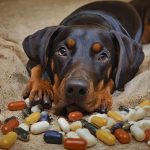Owners of Dobermans often find themselves at a crossroads when deciding on the best diet for their loyal companion. While home-cooked meals may seem appealing due to their perceived freshness and lack of preservatives, commercial dog foods, especially high-quality options, offer scientifically formulated benefits hard to replicate at home. Furthermore, when opting for commercial foods, it’s crucial to understand why certain trends, like grain-free diets, may not be suitable for your Doberman, and how imbalances in vitamins can lead to serious health concerns.
Debunking the Grain-Free Trend
Grain-free diets have become popular in the pet food world, inspired by the idea of a more "natural" diet. However, for Dobermans, this trend can be misleading and potentially harmful. Studies have linked grain-free diets to an increased risk of dilated cardiomyopathy (DCM) in dogs, a serious heart condition. Dobermans are already at a genetic predisposition for DCM, and feeding them a grain-free diet could inadvertently elevate this risk. Grains, when properly processed, are not inherently bad for dogs; they provide essential nutrients, fibers, and energy sources that support overall health.
The Risks of Nutritional Imbalance
Among the trickiest aspects of home-prepared diets is achieving the correct balance of nutrients. Dobermans require a precise blend of protein, fat, carbohydrates, vitamins, and minerals to maintain their vitality and health. An imbalance, especially in critical vitamins like D, E, and B complex, can lead to a host of issues. For instance, vitamin D deficiency can cause bone disorders, while an excess can lead to kidney damage. Similarly, imbalances in calcium and phosphorus can result in skeletal problems, particularly in growing Doberman puppies.
Commercial foods, crafted under the guidance of veterinary nutrition experts, ensure that each meal is balanced and tailored to meet the specific needs of dogs at all life stages. This precision is challenging to achieve in homemade diets, which can unwittingly lead to vitamin excesses or deficiencies, each carrying the risk of serious diseases over time.
The Advantages of Commercial Foods Revisited
Given these concerns, the advantages of high-quality commercial foods become even more significant:
- Complete and Balanced Nutrition: Commercial foods are rigorously formulated to meet the AAFCO Dog Food Nutrient Profiles, ensuring your Doberman receives all necessary nutrients in the right proportions.
- Safety and Reliability: Manufactured foods undergo strict safety protocols to prevent contamination and ensure consistent quality, minimizing the risk of diseases associated with nutritional deficiencies or imbalances.
- Avoidance of Trend-Based Risks: Reputable commercial foods stay updated with the latest nutritional research, steering clear of fad ingredients or compositions that may pose health risks, such as grain-free formulas linked to heart issues.
- Specialized Diets for Health Issues: For Dobermans with specific health concerns, commercial diets offer specially formulated options that would be almost impossible to accurately replicate at home.
Make Informed Decisions
Choosing the right diet for your Doberman means weighing the convenience and balanced nutrition offered by commercial foods against the appeal of home-cooked diets. It's crucial, however, to make these choices based on solid veterinary science and to avoid fads and trends that could inadvertently harm your pet. For Dobermans, the risk of heart disease tied to grain-free diets and the challenge of maintaining nutritional balance are significant factors to consider. High-quality commercial dog foods, vetted by nutritional experts, mitigate these risks, providing a safe and health-focused feeding solution for your beloved companion.
As always, consult with your veterinarian before making changes to your Doberman's diet, ensuring any food chosen meets their individual health needs and lifestyle.

